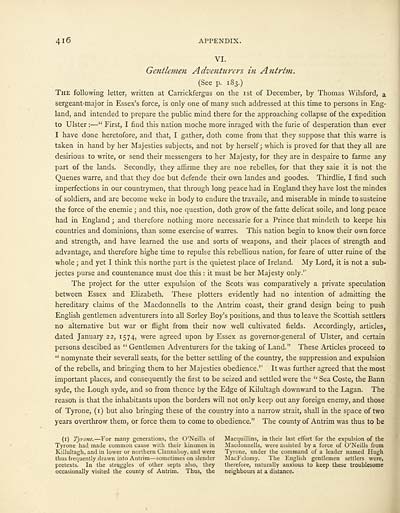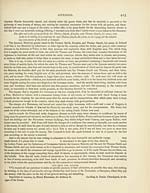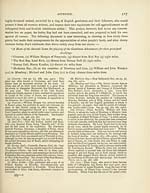Historical account of the Macdonnells of Antrim
(430) Page 416
Download files
Complete book:
Individual page:
Thumbnail gallery: Grid view | List view

4 1 6 APPENDIX.
VI.
Gentlemen Adventurers in Antrim.
(See p. 183.)
The following letter, written at Carrickfergus on the 1st of December, by Thomas Wilsford, a
sergeant-major in Essex's force, is only one of many such addressed at this time to persons in Eng-
land, and intended to prepare the public mind there for the approaching collapse of the expedition
to Ulster : — " First, I find this nation moche more inraged with the furie of desperation than ever
I have done heretofore, and that, I gather, doth come from that they suppose that this warre is
taken in hand by her Majesties subjects, and not by herself; which is proved for that they all are
desirious to write, or send their messengers to her Majesty, for they are in despaire to farme any
part of the lands. Secondly, they affirme they are noe rebelles, for that they saie it is not the
Quenes warre, and that they doe but defende their own landes and goodes. Thirdlie, I find such
imperfections in our countrymen, that through long peace had in England they have lost the mindes
of soldiers, and are become weke in body to endure the travaile, and miserable in minde to susteine
the force of the enemie ; and this, noe question, doth grow of the fatte delicat soile, and long peace
had in England ; and therefore nothing more necessarie for a Prince that mindeth to keepe his
countries and dominions, than some exercise of warres. This nation begin to know their own force
and strength, and have learned the use and sorts of weapons, and their places of strength and
advantage, and therefore highe time to repulse this rebellious nation, for feare of utter ruine of the
whole ; and yet I think this northe part is the quietest place of Ireland. My Lord, it is not a sub-
jectes purse and countenance must doe this : it must be her Majesty only.''
The project for the utter expulsion of the Scots was comparatively a private speculation
between Essex and Elizabeth. These plotters evidently had no intention of admitting the
hereditary claims of the Macdonnells to the Antrim coast, their grand design being to push
English gentlemen adventurers into all Sorley Boy's positions, and thus to leave the Scottish settlers
no alternative but war or flight from their now well cultivated fields. Accordingly, articles,
dated January 22, 1574, were agreed upon by Essex as governor-general of Ulster, and certain
persons descibed as " Gentlemen Adventurers for the taking of Land." These Articles proceed to
" nomynate their severall seats, for the better settling of the country, the suppression and expulsion
of the rebells, and bringing them to her Majesties obedience.'' It was further agreed that the most
important places, and consequently the first to be seized and settled were the " Sea Coste, the Bann
syde, the Lough syde, and so from thence by the Edge of Kilultagh downward to the Lagan. The
reason is that the inhabitants upon the borders will not only keep out any foreign enemy, and those
of Tyrone, (1) but also bringing these of the country into a narrow strait, shall in the space of two
years overthrow them, or force them to come to obedience." The county of Antrim was thus to be
(1) Tyrone. — For many generations, the O'Neills of Macquillins, in their last effort for the expulsion of the
Tyrone had made common cause with their kinsmen in Macdonnells, were assisted by a force of O'Neills from
Killultagh, and in lower or northern Clannaboy, and were Tyrone, under the command of a leader named Hugh
thus frequently drawn into Antrim — sometimes on slender MacFelomy. The English gentlemen settlers were,
pretexts. In the struggles of other septs also, they therefore, naturally anxious to keep these troublesome
occasionally visited the county of Antrim. Thus, the neighbours at a distance.
VI.
Gentlemen Adventurers in Antrim.
(See p. 183.)
The following letter, written at Carrickfergus on the 1st of December, by Thomas Wilsford, a
sergeant-major in Essex's force, is only one of many such addressed at this time to persons in Eng-
land, and intended to prepare the public mind there for the approaching collapse of the expedition
to Ulster : — " First, I find this nation moche more inraged with the furie of desperation than ever
I have done heretofore, and that, I gather, doth come from that they suppose that this warre is
taken in hand by her Majesties subjects, and not by herself; which is proved for that they all are
desirious to write, or send their messengers to her Majesty, for they are in despaire to farme any
part of the lands. Secondly, they affirme they are noe rebelles, for that they saie it is not the
Quenes warre, and that they doe but defende their own landes and goodes. Thirdlie, I find such
imperfections in our countrymen, that through long peace had in England they have lost the mindes
of soldiers, and are become weke in body to endure the travaile, and miserable in minde to susteine
the force of the enemie ; and this, noe question, doth grow of the fatte delicat soile, and long peace
had in England ; and therefore nothing more necessarie for a Prince that mindeth to keepe his
countries and dominions, than some exercise of warres. This nation begin to know their own force
and strength, and have learned the use and sorts of weapons, and their places of strength and
advantage, and therefore highe time to repulse this rebellious nation, for feare of utter ruine of the
whole ; and yet I think this northe part is the quietest place of Ireland. My Lord, it is not a sub-
jectes purse and countenance must doe this : it must be her Majesty only.''
The project for the utter expulsion of the Scots was comparatively a private speculation
between Essex and Elizabeth. These plotters evidently had no intention of admitting the
hereditary claims of the Macdonnells to the Antrim coast, their grand design being to push
English gentlemen adventurers into all Sorley Boy's positions, and thus to leave the Scottish settlers
no alternative but war or flight from their now well cultivated fields. Accordingly, articles,
dated January 22, 1574, were agreed upon by Essex as governor-general of Ulster, and certain
persons descibed as " Gentlemen Adventurers for the taking of Land." These Articles proceed to
" nomynate their severall seats, for the better settling of the country, the suppression and expulsion
of the rebells, and bringing them to her Majesties obedience.'' It was further agreed that the most
important places, and consequently the first to be seized and settled were the " Sea Coste, the Bann
syde, the Lough syde, and so from thence by the Edge of Kilultagh downward to the Lagan. The
reason is that the inhabitants upon the borders will not only keep out any foreign enemy, and those
of Tyrone, (1) but also bringing these of the country into a narrow strait, shall in the space of two
years overthrow them, or force them to come to obedience." The county of Antrim was thus to be
(1) Tyrone. — For many generations, the O'Neills of Macquillins, in their last effort for the expulsion of the
Tyrone had made common cause with their kinsmen in Macdonnells, were assisted by a force of O'Neills from
Killultagh, and in lower or northern Clannaboy, and were Tyrone, under the command of a leader named Hugh
thus frequently drawn into Antrim — sometimes on slender MacFelomy. The English gentlemen settlers were,
pretexts. In the struggles of other septs also, they therefore, naturally anxious to keep these troublesome
occasionally visited the county of Antrim. Thus, the neighbours at a distance.
Set display mode to:
![]() Universal Viewer |
Universal Viewer | ![]() Mirador |
Large image | Transcription
Mirador |
Large image | Transcription
Images and transcriptions on this page, including medium image downloads, may be used under the Creative Commons Attribution 4.0 International Licence unless otherwise stated. ![]()
| Histories of Scottish families > Historical account of the Macdonnells of Antrim > (430) Page 416 |
|---|
| Permanent URL | https://digital.nls.uk/95346407 |
|---|
| Description | A selection of almost 400 printed items relating to the history of Scottish families, mostly dating from the 19th and early 20th centuries. Includes memoirs, genealogies and clan histories, with a few produced by emigrant families. The earliest family history goes back to AD 916. |
|---|

